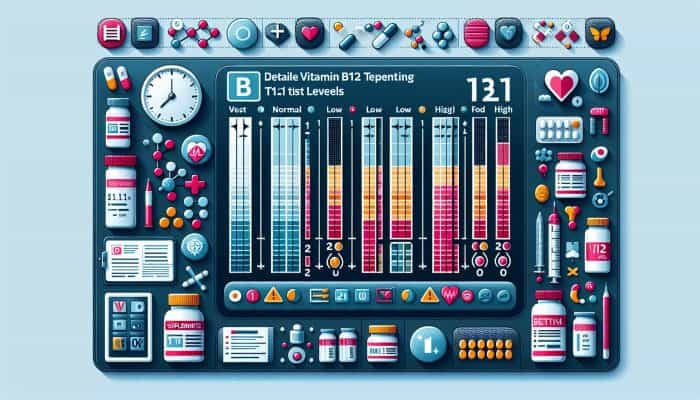Understand the Crucial Importance of a Vitamin B12 Blood Test for Your Health
Uncover the Essential Contributions of Vitamin B12 to Your Overall Well-being

The Vitamin B12 Blood Test in Derby is immensely significant, as Vitamin B12 is a vital nutrient that underpins numerous biological functions critical for maintaining human health. This essential vitamin is particularly indispensable for ensuring a healthy nervous system and promoting the production of red blood cells. When levels of this vital vitamin drop, it can result in a host of health issues, including debilitating fatigue, pronounced weakness, and various neurological complications. For those living in Derby, it is crucial to recognise how specific dietary habits and lifestyle choices can influence their Vitamin B12 levels, potentially leading to deficiencies.
Furthermore, Vitamin B12 plays an essential role in DNA synthesis and cellular metabolism, both of which are fundamental processes for sustaining life. The consequences of a deficiency can be serious; they may lead to long-term health repercussions such as pernicious anaemia and cognitive decline. Gaining a comprehensive understanding of the critical role of Vitamin B12 is a significant step towards achieving and maintaining optimal health, particularly for individuals at heightened risk of deficiency.
What Is the Procedure for Conducting a Vitamin B12 Blood Test?
The Vitamin B12 blood test involves a straightforward yet effective procedure in which a qualified healthcare professional collects a small blood sample. Typically, this consists of drawing blood from a vein in your arm using a sterile needle. Once the sample is obtained, it is dispatched to a laboratory for thorough analysis, where skilled technicians quantify the concentration of Vitamin B12 present in your bloodstream.
In most instances, no special preparation is necessary prior to the test; however, some healthcare providers may recommend fasting for several hours beforehand to enhance the accuracy of the results. You can generally expect to receive your results within a few days, which will provide valuable insights into your Vitamin B12 levels and overall health situation. This simple yet vital test can greatly benefit individuals experiencing symptoms associated with deficiency, allowing for timely diagnosis and intervention.
Who Should Consider Undergoing a Vitamin B12 Blood Test?
Individuals displaying symptoms such as fatigue, weakness, or neurological disturbances should earnestly contemplate undergoing a Vitamin B12 blood test. This is particularly important for residents of Derby who fall into specific risk categories, including older adults, vegans, and those suffering from gastrointestinal disorders. Such populations often struggle to maintain sufficient Vitamin B12 levels due to dietary restrictions or absorption issues related to their health conditions.
Moreover, individuals who have undergone gastrointestinal surgeries or are taking medications that may interfere with nutrient absorption should be particularly vigilant. The Vitamin B12 blood test serves as an essential diagnostic tool to identify deficiencies, enabling timely treatment and intervention, which are crucial for sustaining optimal health and avoiding severe complications.
What Do Your Vitamin B12 Test Results Reveal About Your Health?

Understanding the results of your Vitamin B12 blood test is vital for evaluating your overall health status. The outcomes will indicate whether your Vitamin B12 levels are normal, low, or high. Typically, normal levels are considered to be between 190 and 950 picograms per millilitre; however, many healthcare professionals advocate for aiming for levels above 400 picograms per millilitre to reap optimal health benefits.
If your test results indicate low Vitamin B12 levels, it may be necessary to discuss dietary changes, potential supplementation, or further tests to uncover any underlying health problems. Elevated levels, although less common, may also suggest health complications that require additional investigation with a healthcare provider. By fully understanding your test results, you can take proactive measures to enhance your health and maintain adequate Vitamin B12 levels.
Insights and Recommendations from Experts on Vitamin B12 Testing in Derby
What Guidance Do Healthcare Professionals Offer Regarding Vitamin B12 Testing?
Healthcare professionals in Derby strongly emphasise the importance of regular Vitamin B12 testing, particularly for at-risk groups. Dr. Sarah Betts, a local general practitioner, highlights that many patients presenting with fatigue often have undiagnosed Vitamin B12 deficiencies. She recalls a particular instance involving a 65-year-old patient who suffered from extreme fatigue and memory issues. Following a Vitamin B12 blood test, the patient was diagnosed with a deficiency and successfully treated with supplements, resulting in a significant improvement in her quality of life.
Experts also stress the preventive benefits of Vitamin B12 testing. Consultant nutritionist Mark Turner points out that routine testing can lead to the early detection of deficiencies, which is especially pertinent in Derby, where common dietary practices may not always include sufficient Vitamin B12-rich foods. By understanding local dietary habits, healthcare providers can better guide their patients towards achieving improved health outcomes.
How Can You Effectively Interpret and Understand Your Test Results?

Interpreting your Vitamin B12 test results is crucial for gaining a comprehensive understanding of your health condition. If your results fall within the normal range, it signifies that your body is effectively absorbing Vitamin B12. Conversely, if your levels are low, it is essential to take proactive steps. Begin by consulting with your healthcare provider to evaluate your symptoms and dietary habits. They may recommend incorporating more Vitamin B12-rich foods into your diet or exploring supplementation options.
In instances where levels are critically low, further tests may be necessary to diagnose underlying causes, such as pernicious anaemia or gastrointestinal absorption issues. Your healthcare provider can develop a tailored treatment plan based on your specific needs. This collaborative approach ensures you receive the most effective interventions for maintaining optimal health and averting complications.
Where Can You Access Reliable Vitamin B12 Testing Facilities in Derby?
For residents of Derby seeking to undergo a Vitamin B12 blood test, there are several reputable clinics and hospitals available to facilitate this vital service. One prominent facility is the Royal Derby Hospital, renowned for its comprehensive diagnostic services. They provide advanced testing options and have a dedicated team of experts ready to guide you through the process. Another excellent option is the Sinai Medical Centre, where you can schedule an appointment with a general practitioner who will assess your need for testing.
Contact information for these facilities includes:
- Royal Derby Hospital – Tel: 01332 340 131
- Sinai Medical Centre – Tel: 01332 204 056
- Derby Health Centre – Tel: 01332 645 200
- Or Visit: Private Blood Test Derby to arrange for a nurse to visit your home.
It is advisable to call ahead to confirm testing availability and to ascertain if an appointment is required. Choosing a trusted facility will ensure a seamless testing experience and accurate results.
Discover the Benefits of Regular Vitamin B12 Testing
How Does Sufficient Vitamin B12 Support Your Overall Health and Wellness?
Maintaining adequate Vitamin B12 levels provides a multitude of health benefits that greatly enhance overall well-being. Primarily, Vitamin B12 plays a vital role in preventing anaemia, as it is essential for the proper formation of red blood cells. This function ensures efficient oxygen transport throughout the body, resulting in improved energy levels and enhanced vitality.
Moreover, optimal Vitamin B12 levels are critical for maintaining cognitive health. Research has shown that sufficient Vitamin B12 can aid in mitigating cognitive decline and supporting memory functions, which is particularly relevant for the ageing population in Derby. Furthermore, individuals with balanced Vitamin B12 levels often report better mood regulation, significantly reducing the risk of developing depression and anxiety.
In What Ways Can Testing Help Prevent Vitamin B12 Deficiency?
Regular testing for Vitamin B12 is essential for preventing deficiencies before they progress into serious health issues. Identifying low levels early allows healthcare providers to recommend dietary adjustments or supplements to rectify the deficiency. For example, residents of Derby who adhere to a strict vegan diet may need additional Vitamin B12 supplementation, as plant-based foods generally lack this crucial nutrient.
Moreover, early testing can identify individuals at risk, such as older adults or those with specific medical conditions that impede their ability to absorb nutrients. This proactive approach facilitates timely intervention and can prevent long-term complications associated with untreated deficiencies, including neurological damage or severe anaemia.
Can Regular Testing Enhance Your Quality of Life?
Monitoring and maintaining optimal Vitamin B12 levels can significantly improve an individual’s quality of life. Many people who undergo testing and subsequently address deficiencies report remarkable enhancements in energy levels, mood, and cognitive function. Residents of Derby have shared positive experiences illustrating their renewed energy and sharper thinking after effectively managing their Vitamin B12 deficiencies.
Additionally, individuals with adequate Vitamin B12 levels often find that they can engage more fully in daily activities, pursue hobbies, and maintain social connections, all contributing to a richer, more fulfilling life. Regular testing serves as an invaluable tool in this journey, ensuring individuals remain informed about their nutritional health and take necessary steps for improvement.
Recognising the Symptoms of Vitamin B12 Deficiency
How Can You Identify the Signs of Vitamin B12 Deficiency?
Recognising the symptoms of Vitamin B12 deficiency is crucial for timely intervention. Common indicators include fatigue, weakness, and memory loss, which are frequently mistaken for typical signs of ageing or stress. Residents of Derby experiencing these symptoms should not take them lightly, as they may signal a more serious health issue. Another noteworthy symptom is tingling or numbness in the hands and feet, which can indicate nerve damage due to insufficient Vitamin B12 levels.
Being attentive to these symptoms is essential for early diagnosis. If you notice a combination of these indicators, it is advisable to consult a healthcare provider for a Vitamin B12 blood test. Early detection can lead to effective treatment, preventing more severe health complications from arising.
What Risk Factors Are Associated with Vitamin B12 Deficiency?
Certain demographic groups are at a heightened risk for Vitamin B12 deficiency, making regular testing and vigilance essential. Older adults often experience decreased nutrient absorption due to age-related changes in the digestive system. Similarly, individuals following a vegan or strict vegetarian diet may not consume adequate animal products, which are the primary sources of Vitamin B12.
Additionally, people with gastrointestinal disorders such as Crohn’s disease or those who have undergone surgeries affecting the intestines may encounter challenges in absorbing Vitamin B12 effectively. Understanding these risk factors empowers individuals to pursue regular testing and take proactive measures to ensure they maintain sufficient Vitamin B12 levels.
When Should You Consult a Healthcare Provider?
If you are experiencing persistent symptoms commonly associated with Vitamin B12 deficiency, it is imperative to consult a healthcare provider without delay. Symptoms such as severe fatigue, cognitive difficulties, or abnormal sensations in your limbs necessitate a comprehensive evaluation. In Derby, healthcare professionals can provide timely access to testing and subsequent treatment options.
Furthermore, even in the absence of severe symptoms, individuals belonging to at-risk groups should consider regular check-ups to monitor their Vitamin B12 levels effectively. Prioritising your health and seeking medical advice when necessary is crucial to preventing complications related to untreated deficiencies.
What Are the Long-Term Consequences of Untreated Vitamin B12 Deficiency?
Neglecting to address a Vitamin B12 deficiency can lead to significant long-term health ramifications. Untreated deficiencies may cause considerable neurological damage, resulting in irreversible cognitive decline and memory loss. Additionally, individuals may develop severe anaemia, characterised by debilitating fatigue and weakness, severely impacting daily life.
Moreover, there is an increased risk of developing cardiovascular diseases due to low Vitamin B12 levels, as this vitamin is pivotal for maintaining heart health. Recognising the risks associated with untreated deficiencies underscores the necessity of early diagnosis and treatment, which can help prevent these serious complications from developing.
Best Practices for Effective Vitamin B12 Blood Testing in Derby
What Protocols Should Be Followed for Optimal Vitamin B12 Testing?
To maximise the effectiveness of Vitamin B12 testing, several best practices should be considered. Timing is critical; experts recommend testing after fasting, as this can enhance the accuracy of results. Furthermore, individuals should consult their healthcare provider to determine the appropriate frequency for testing, particularly if they belong to a high-risk group.
Follow-up care is equally crucial. Once test results are available, discussing them with your healthcare professional is essential for a comprehensive understanding of their implications. They can suggest dietary changes or supplementation strategies tailored to your individual needs. Regular monitoring aids in maintaining optimal Vitamin B12 levels and ensures that any deficiencies are addressed promptly.
How Should You Prepare for Your Vitamin B12 Blood Test?
Preparation for a Vitamin B12 blood test can significantly enhance the accuracy of the results. Here are some key steps to take before your test:
- Consult your healthcare provider regarding any medications that may interfere with the results of the test.
- Consider fasting for at least 4 to 6 hours prior to the test.
- Stay well-hydrated to facilitate the blood collection process.
- Inform the nurse of any symptoms you’re experiencing to provide context during the analysis.
By adhering to these preparatory steps, you can help ensure that your blood test yields accurate results, allowing for a thorough analysis of your Vitamin B12 levels.
Where Can You Access Reliable Information on Vitamin B12 Testing?
Accessing trustworthy information regarding Vitamin B12 testing in Derby is paramount for making informed health decisions. Local health authorities, such as the Derby City Council website, offer valuable resources related to nutrient deficiencies and available testing services. Moreover, respected medical centres in Derby often provide educational materials for patients, detailing the importance of Vitamin B12.
Additionally, engaging with healthcare professionals, including dietitians and general practitioners, can furnish personalised advice based on individual health needs. They can direct you to reputable resources and assist you in navigating the complexities of Vitamin B12 testing and treatment.
Effective Strategies for Maintaining Healthy Vitamin B12 Levels
Which Foods Are Excellent Sources of Vitamin B12?
To maintain healthy Vitamin B12 levels, it is vital to incorporate a diverse range of foods rich in this essential nutrient into your daily diet. Animal products serve as the primary sources of Vitamin B12, which include:
- Meat, particularly organ meats like liver and red meats
- Fish, with salmon and tuna being exceptional sources
- Eggs, especially the yolk
- Dairy products, such as milk, cheese, and yogurt
For those adhering to a vegetarian or vegan diet, fortified foods present an alternative source of Vitamin B12. Items such as fortified plant-based milk, breakfast cereals, and nutritional yeast can help bridge the nutrient gap. Ensuring a balanced diet that includes a variety of these foods is crucial for maintaining optimal Vitamin B12 levels in the body.
Can Supplements Offer Additional Health Benefits?
Vitamin B12 supplements can be advantageous, particularly for individuals at risk of deficiency, including vegetarians, vegans, and those with absorption challenges. These supplements are available in numerous forms, including tablets, capsules, and sublingual options, providing flexibility in consumption methods.
For residents of Derby, consulting a healthcare provider prior to initiating any supplement regimen is advisable. They can recommend the appropriate dosage and form based on your individual needs, ensuring you receive the correct level of supplementation necessary to maintain healthy Vitamin B12 levels.
How Frequently Should You Monitor Your Vitamin B12 Levels?
Regular monitoring of Vitamin B12 levels is essential for those at risk of deficiency. Generally, individuals should have their levels assessed annually; however, this frequency may vary based on personal health circumstances. For instance, older adults or those with gastrointestinal conditions may require more frequent testing.
Consulting with your healthcare provider can help determine the appropriate monitoring schedule. This proactive approach allows individuals to sustain optimal Vitamin B12 levels and promptly address any deficiencies, ensuring long-term health and well-being.
What Symptoms Might Indicate a Potential Vitamin B12 Deficiency?
Symptoms of Vitamin B12 deficiency can manifest in various ways, often leading individuals to underestimate their significance. Common signs include fatigue, weakness, and cognitive issues, such as memory lapses. Additionally, individuals may experience neurological symptoms, including tingling or numbness in the extremities, which can be distressing.
If you encounter these symptoms, it is crucial to consult a healthcare provider promptly. Recognising these early warning signs can facilitate timely testing and treatment, helping to prevent more severe complications associated with Vitamin B12 deficiency from developing.
How Does Age Impact Vitamin B12 Absorption?
As individuals age, their capacity to absorb Vitamin B12 from food may decline due to changes in digestive function. Factors such as decreased stomach acid production and alterations in gut bacteria can hinder absorption. This makes older adults particularly susceptible to Vitamin B12 deficiency.
To mitigate this issue, older adults are often advised to consume fortified foods or consider supplementation to ensure they maintain adequate B12 levels. Regular testing and monitoring can also assist in assessing their Vitamin B12 status, helping to keep them in optimal health as they age.
Frequently Asked Questions About Vitamin B12 Testing
What Is the Purpose of a Vitamin B12 Blood Test?
A Vitamin B12 blood test quantifies the concentration of this essential vitamin in your bloodstream, aiding in diagnosing deficiencies and informing subsequent treatment strategies.
Who Should Consider Getting a Vitamin B12 Test?
Individuals experiencing symptoms such as fatigue or those at risk, including older adults and vegans, should seriously consider testing their Vitamin B12 levels.
How Often Should I Get a Vitamin B12 Test?
Typically, you should be tested annually, especially if you belong to a high-risk group or exhibit symptoms of deficiency.
Which Foods Are Rich Sources of Vitamin B12?
Animal products, including meat, fish, eggs, and dairy, are abundant in Vitamin B12. Fortified foods serve as alternatives for those following vegetarian or vegan diets.
Is Vitamin B12 Deficiency Treatable?
Yes, Vitamin B12 deficiency can be effectively managed through dietary adjustments, supplements, or injections, depending on the severity of the deficiency.
What Symptoms Are Associated with Vitamin B12 Deficiency?
Symptoms include fatigue, weakness, cognitive difficulties, and abnormal sensations like tingling in the hands and feet.
How Can I Prepare for My Vitamin B12 Blood Test?
Prepare for the test by fasting for 4 to 6 hours and consulting your healthcare provider about any medications you may be taking.
Where Can I Get Tested for Vitamin B12 Levels in Derby?
You can undergo testing at local clinics and hospitals such as Royal Derby Hospital and Sinai Medical Centre.
What Is the Normal Range for Vitamin B12 Levels?
Normal Vitamin B12 levels typically fall between 190 and 950 picograms per millilitre.
Why Is Vitamin B12 Essential for Your Health?
Vitamin B12 is vital for nerve function, red blood cell production, and overall energy levels, significantly impacting your health and well-being.
Connect with us on Facebook!
This Article Was First Found On https://bloodtest.co.uk
The Article Vitamin B12 Blood Test: The Ultimate Local Guide for Derby Was Found On https://limitsofstrategy.com


